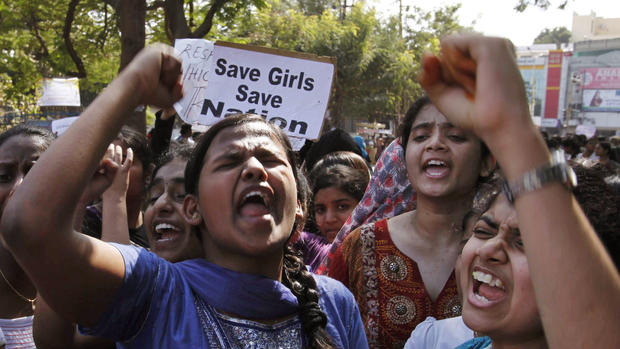India rape seems likely to foster change, but women's advocates acknowledge it will be a "long haul"
NEW DELHI India's army and navy canceled New Year's celebrations on Monday out of respect for a New Delhi student whose gang-rape and murder has set off an impassioned debate about what the nation needs to do to prevent such a tragedy from happening again.
Protesters and politicians have called for tougher rape laws, major police reforms and a transformation in the way the country treats its women.
"To change a society as conservative, traditional and patriarchal as ours, we will have a long haul," said Ranjana Kumari, director of the Center for Social Research. "It will take some time, but certainly there is a beginning."
The country remained in mourning Monday, two days after the 23-year-old physiotherapy student died from her internal wounds in the Singapore hospital where she had been sent for emergency treatment. Six men have been arrested and charged with murder in the Dec. 16 attack on a New Delhi bus. They face the death penalty if convicted, police said.
- India gang-rape victim's body cremated
- Suspects in India rape case charged with murder
- Watch: India gov't pressured over violence toward women
CBS News' Sanjay Jha reports that police said Monday they had finalized a charge sheet to be presented in court later in the week. The crimes are detailed in about 1,000 pages, which name about 30 witnesses to the incident.
The army and navy canceled their New Year's celebrations, as did Sonia Gandhi, head of the ruling Congress party. Hotels and clubs across the capital also said they would forego their usual parties.
"She has become the daughter of the entire nation," said Sushma Swaraj, a leader of the opposition Bharatiya Janata Party.
Hundreds of mourners continued their daily protests near Parliament demanding swift government action.
"So much needs to be done to end the oppression of women," said Murarinath Kushwaha, a man whose two friends were on a hunger strike to draw attention to the issue.
Some commentators compared the rape victim, whose name has not been released by police, to Mohamed Bouazizi, the Tunisian street vendor whose self-immolation set off the Arab Spring.
Jha reports that the editor, publisher and a reporter from one Indian newspaper, the Mail Today, is facing charges after revealing the victim's identity, and publishing it along with a photo of her brother.
There was hope her tragedy could mark a turning point for gender rights in a country where women often refuse to leave their homes at night out of fear and where sex-selective abortions and even female infanticide have wildly skewed the gender ratio.
"It cannot be business as usual anymore," the Hindustan Times newspaper wrote in an editorial.
Politicians from across the spectrum called for a special session of Parliament to pass new laws to increase punishments for rapists — including possible chemical castration — and to set up fast-track courts to deal with rape cases within 90 days.
The government has proposed creating a public database of convicted rapists to shame them, and Prime Minister Manmohan Singh has set up two committees to look into what lapses led to the rape and to propose changes in the law.
The Delhi government on Monday inaugurated a new helpline — 181 — for women, though it wasn't working because of glitches.
Responding to complaints that police refuse to file cases of abuse or harassment brought by women, the city force has appointed an officer to meet with women's groups monthly and crack down on the problem, New Delhi Lt. Gov. Tejendra Khanna said.
"We have mandated that any time any lady visits a police station with a complaint, it has to be recorded on the spot," he said.
Kumari said the Delhi police commissioner sent her a message Monday asking her group to restart police sensitivity training that it had suspended due to lack of funds.
There have also been proposals to install a quota to ensure one-third of Delhi's police are women.
There also have been signs of a change in the public debate about crimes against women.
Other rapes suddenly have become front-page news in Indian newspapers, and politicians are being heavily criticized for any remarks considered misogynistic or unsympathetic to women.
A state legislator from Rajasthan was ridiculed Monday across TV news channels after suggesting that one way to stop rapes would be to change girls' school uniforms to pants instead of skirts.
"How can he tell us to change our clothes?" said Gureet Kaur, a student protester in the Rajasthani town of Alwar. "Why can't girls live freely?"
Some activists have accused politicians of being so cossetted in their security bubbles that they have no idea of the daily travails people are suffering.
Kumari said the country was failing in its basic responsibility to protect its citizens. But she was heartened to see so many young men at the protests along with women.
"I have never heard so many people who felt so deep down hurt," she said. "It will definitely have some impact."
